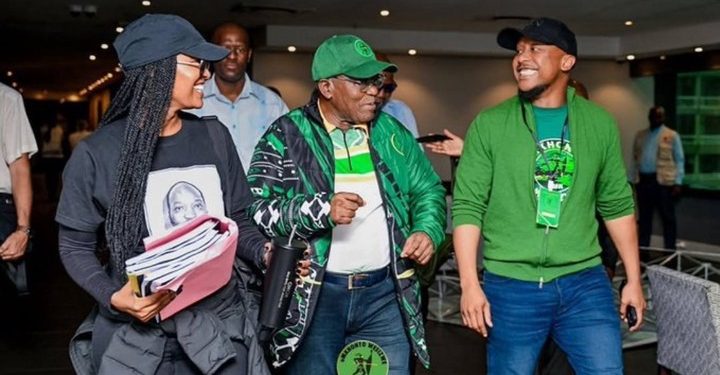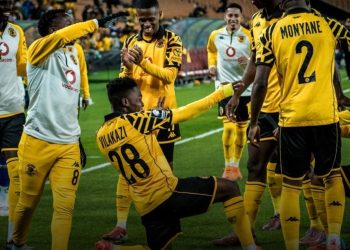Former South African president Jacob Zuma made his first significant international appearance since his 2023 prison sentence remission by attending Friday’s inauguration of Gabon’s President Brice Oligui Nguema. The high-profile delegation from Zuma’s uMkhonto weSizwe (MK) Party included his daughter Duduzile Zuma-Sambudla, along with senior party officials Magasela Mzobe, Floyd Shivambu, and Mpiyakhe Limba.
The trip highlighted the MK Party’s efforts to strengthen African diplomatic ties, particularly within Francophone nations. Mzobe described the visit as reflecting the party’s dedication to “Pan-African solidarity and post-colonial cooperation.” The 83-year-old Zuma, who remains a controversial figure, continues to wield political influence despite facing an ongoing corruption trial related to a 1999 arms deal scheduled for April 2025.
H.E. President Jacob Zuma, accompanied by Hon. Dudu Zuma-Sambudla, Head of the Presidency Magasela Mzobe, SG Floyd Shivambu, and TG Mpiyakhe Limba, attended the inauguration of President Brice Oligui Nguema of Gabon. pic.twitter.com/LeBqXsRBKc
— uMkhonto WeSizwe Party (Official) (@MkhontoweSizwex) May 3, 2025
While the delegation presented a united front, internal divisions within the MK Party have surfaced. Secretary-General Floyd Shivambu, a former EFF leader, has faced accusations of authoritarian leadership and financial mismanagement. A formal complaint by party employee Srini Naidoo alleges Shivambu imposed staff austerity measures while approving luxury expenses for himself.
Duduzile Zuma-Sambudla, viewed as a potential successor to her father, has become a rallying point for dissent against Shivambu’s leadership. However, Mzobe denied claims of a leadership crisis, insisting Shivambu’s decisions have full party backing. “Disciplinary procedures will address any grievances, but our priority remains strengthening the MK Party’s political standing,” Mzobe stated.
Zuma’s presence at the Gabon ceremony demonstrated his enduring diplomatic influence, built during his presidency when he mediated regional conflicts. Yet back home, the MK Party faces organizational challenges, including financial disputes over unpaid salaries and office rents. Treasurer-General Limba must resolve these issues as the party prepares for South Africa’s 2026 local elections.
The Gabon trip underscores Zuma’s continued political ambitions despite legal and internal party struggles. The MK Party’s future may depend on whether it can reconcile its ideological foundations with practical governance demands, positioning itself as a credible alternative to the ANC. Zuma’s legacy remains deeply connected to both South Africa’s liberation history and its evolving political landscape.






















